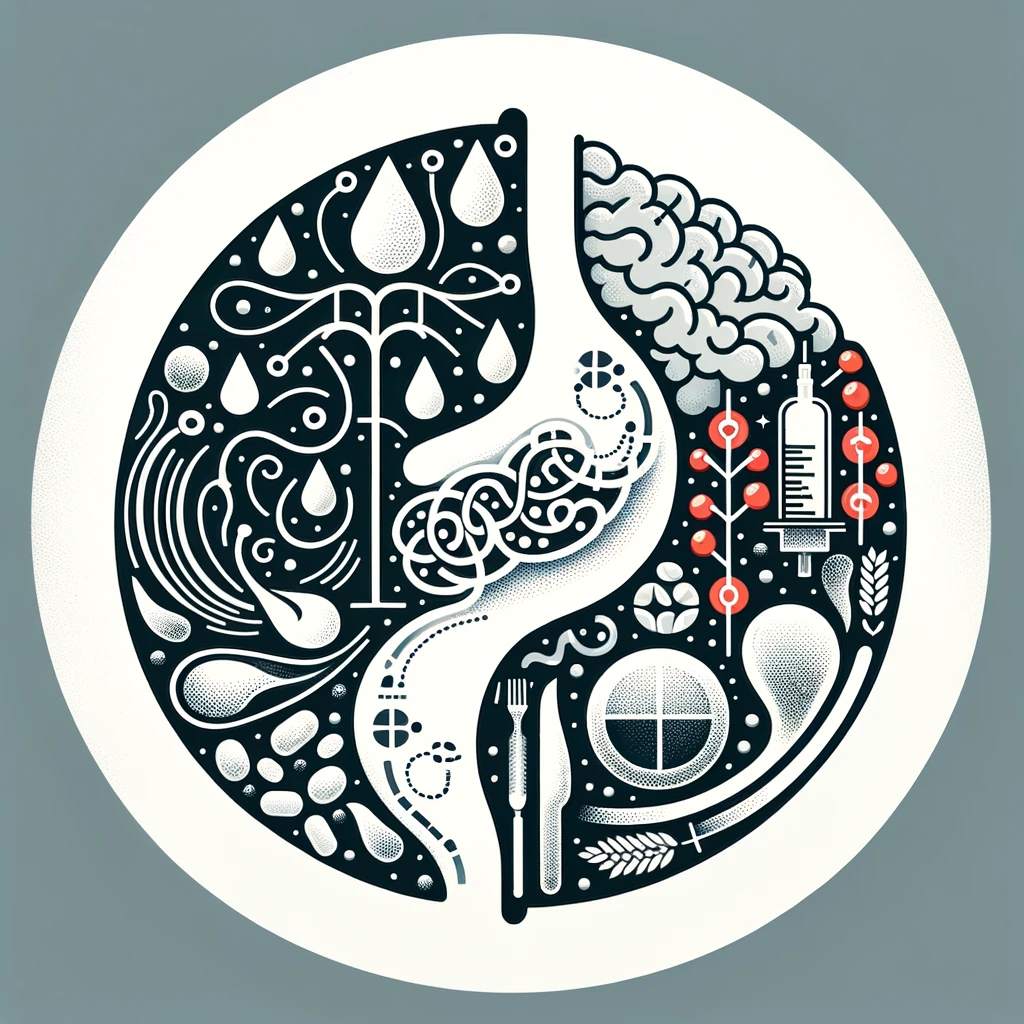Diabetes is a chronic condition where blood sugar levels are consistently elevated due to insulin dysfunction. Management involves medication, lifestyle adjustments, and regular monitoring to control blood sugar levels and prevent complications.

What is Diabetes, and Why It Happens?
The inability of the body to control glucose levels in the blood leads to a chronic illness known as diabetes. Glucose is a crucial energy source for cells, and the pancreatic hormone insulin strictly regulates its levels in the bloodstream.
There Are Two Main Types of Diabetes:
Type 1 Diabetes: Those cells in the pancreas that are accountable for the synthesis of insulin are the ones that are targeted and eliminated by the immune system, which is the root cause of type 1 diabetes. The result is that the body generates very little or no insulin. Diabetes type 1, which is commonly diagnosed in childhood or adolescence, requires insulin injections as a necessary treatment for individuals who have the condition. This is because insulin injections are vital for controlling blood sugar levels.
Type 2 Diabetes: In this type, the body either does not produce enough insulin or the cells become resistant to the effects of insulin. Type 2 diabetes is more common in adults, especially those who are overweight or have a sedentary lifestyle. Alterations to one's way of life, oral medications, and even insulin therapy are frequently effective methods for managing this condition.
The exact causes of diabetes are complex and can involve genetic and environmental factors. Some common risk factors for developing diabetes include:
Genetics: A history of diabetes in one's family can raise the risk.
Obesity: Having too much body weight, especially in the abdominal area, significantly raises the chance of developing type 2 diabetes.
Physical Inactivity: Insufficient physical exercise can lead to the onset of diabetes.
Age: Diabetes risk grows with age, particularly after reaching 45 years old.
Poor Diet: Poor dietary choices, such as consuming processed foods, sweets, and unhealthy fats, can increase the risk of developing diabetes.
Ethnicity: Specific ethnic groups, including African Americans, Hispanic Americans, and Native Americans, face an elevated risk.
Causes of Diabetes:
Diabetes has multiple origins that result from a combination of genetic, environmental, and lifestyle factors. There are two main types of diabetes, each with its own set of contributing factors:
Type 1 Diabetes:
Genetic Factors: There is a vital genetic component to type 1 diabetes. Individuals with a family history of the condition are at a higher risk.
Autoimmune Response: Type 1 diabetes is an autoimmune disorder characterized by the immune system erroneously targeting and eliminating the insulin-producing beta cells in the pancreas. The precise stimuli for this autoimmune reaction have yet to be entirely understood. The condition is believed to result from hereditary and environmental factors, including viral infections.
Type 2 Diabetes:
Genetics: Family history plays a role in type 2 diabetes, and individuals with close relatives who have the condition may be at a higher risk.
Insulin Resistance: In type 2 diabetes, Cellular resistance to insulin develops in the organism, or the pancreas may not produce enough insulin. The exact reasons for insulin resistance are complex and may involve genetic and lifestyle factors.
Obesity: Having too much body weight, especially excess fat around the abdomen, dramatically increases the chance of developing type 2 diabetes. Fat cells, especially those around the abdomen, can release substances contributing to insulin resistance.
Lifestyle Factors: Inadequate physical activity and improper dietary choices, like consuming processed foods, sweets, and unhealthy fats, can lead to the onset of type 2 diabetes.
Age: The probability of having type 2 diabetes increases with age, especially after becoming 45 years old.
Gestational Diabetes:
Pregnancy: Some women may develop gestational diabetes during pregnancy. Pregnancy-induced hormonal fluctuations and increased body weight can impact the body's responsiveness to insulin.
It is crucial to understand that although these factors have a role in the onset of diabetes, not all individuals with these risk factors will necessarily get the condition. Additionally, there may be other, less common forms of diabetes with different underlying causes. Consistent medical examinations, a healthy lifestyle, and controlling risk factors are essential for preventing or treating diabetes successfully.
Diabetes Cure:
Both Type 1 and Type 2 diabetes are chronic conditions that require lifelong management. However, there have been significant advancements in the treatment and management of diabetes, allowing individuals to lead healthy and fulfilling lives.
For Type 1 Diabetes:
Insulin Therapy: Patients with type 1 diabetes must give insulin through injections or an insulin pump to control their blood sugar levels.
Islet Cell Transplantation: Islet cell transplantation and other experimental techniques are being researched as potential treatments, although they are not commonly accessible.
For Type 2 Diabetes:
Lifestyle Changes: Living a healthy lifestyle entails eating right and getting enough exercise, and weight management is crucial in managing Type 2 diabetes.
Oral Medications: Some individuals may be prescribed oral medications to help control blood sugar levels.
Insulin Therapy: Insulin treatment may be necessary for specific individuals with type 2 diabetes, particularly as the condition progresses.
While there is no cure, ongoing research is exploring various avenues, including:
Beta Cell Regeneration: Research into methods to promote beta cell regeneration in the pancreas, which produces insulin, is ongoing.
Immunotherapy: In the case of Type 1 diabetes, researchers are exploring immunotherapies to modulate the autoimmune response that destroys insulin-producing cells.
Diabetes Prevention:
Preventing diabetes, especially Type 2 diabetes, involves adopting a healthy lifestyle and managing risk factors. A person's lifestyle significantly affects their risk of having Type 2 diabetes, in contrast to Type 1 diabetes, which cannot be avoided. Here are some critical strategies for diabetes prevention:
Maintain a Healthy Weight:
- Insulin endurance and the development of type 2 diabetes are potential outcomes that are more likely to occur in individuals who are overweight, particularly those who have a significant amount of abdominal fat.
- To reach and keep a healthy weight throughout one's life, consuming nutritious foods and engaging in regular physical activity is essential.
Adopt a Healthy Diet:
- Always focus on consuming a varied and healthy diet that includes fruits, vegetables, whole grains, lean proteins, and healthy fats.
- Take steps to reduce your consumption of processed meals, beverages with added sugars, and foods high in harmful fats and added sugars.
Engage in Regular Physical Activity:
- Regular exercise can aid weight management by increasing insulin sensitivity.
- Strive for at least two days of strength training and 150 minutes of moderate-intensity aerobic exercise each week.
Monitor Blood Sugar Levels:
- Individuals at higher risk for diabetes should have regular check-ups and monitor their blood sugar levels.
- Early detection and management of elevated blood sugar levels can help prevent the progression of diabetes.
Limit Sedentary Behavior:
- Cut down on sitting and other forms of inactivity. Intersperse lengthy periods of sitting with brief bursts of exercise.
Quit Smoking:
- Tobacco use is related to an increased incidence of cardiovascular disease and type 2 diabetes. Quitting smoking can have numerous health benefits.
Moderate Alcohol Consumption:
- Drink alcohol in moderation if you so choose. Heavy alcohol use increases the likelihood of getting Type 2 diabetes and can direct to weight increase.
Manage Stress:
- Chronic stress may contribute to unhealthy lifestyle choices. Participate in stress-reducing activities like yoga meditation, and mindfulness.
Regular Health Check-ups:
- Schedule regular check-ups with healthcare professionals for screenings and monitoring of blood sugar levels, especially if you have risk factors for diabetes.
Know Your Family History:
- Understanding your family history can assist in determining your diabetes risk. Discuss any family history of diabetes with your healthcare provider.
Symptoms of Diabetes
Symptoms of diabetes include increased thirst, frequent urination, unexplained weight loss, fatigue, blurred vision, and slow wound healing. Early detection through monitoring these signs is crucial for timely management and prevention of complications.




